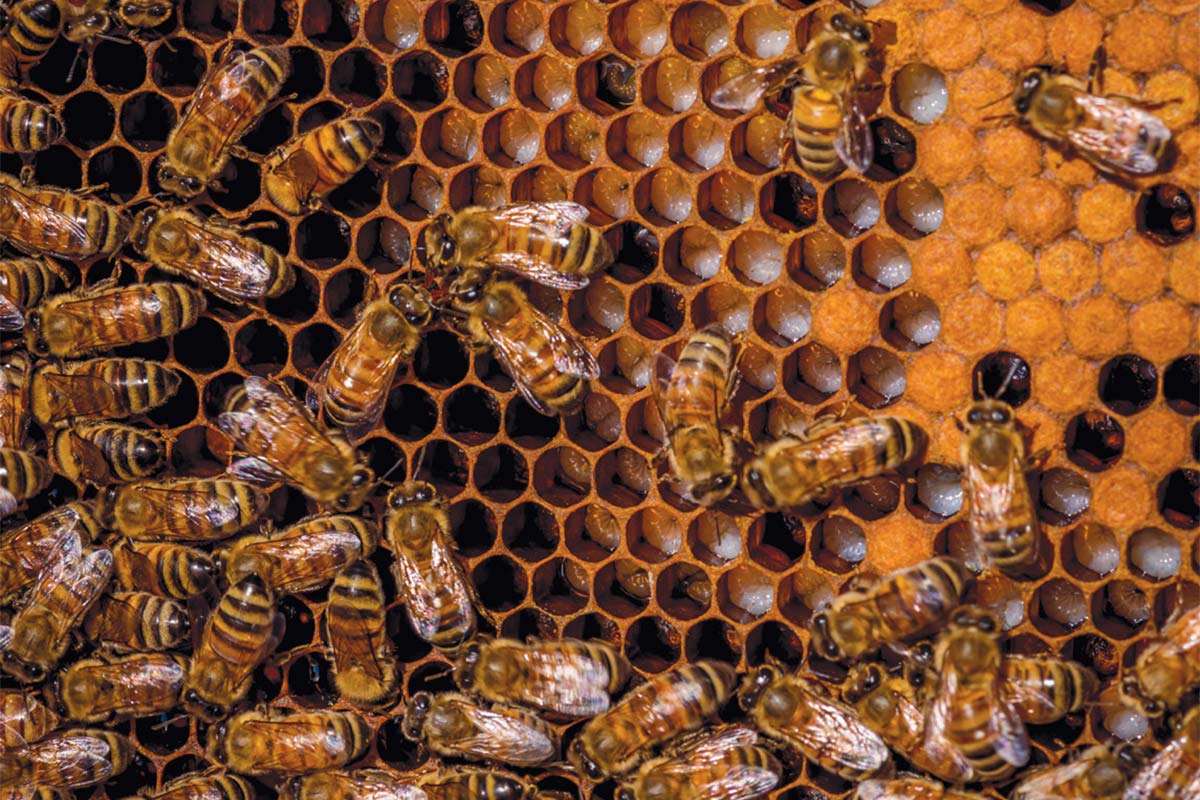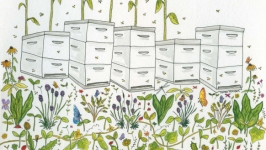Backyard Beekeeping
New Jersey wouldn’t be called the Garden State if it weren’t for all the pollinators that make it possible, and with the state insect being the honeybee (Apis mellifera), it’s no surprise there are so many passionate beekeepers. According to the New Jersey Beekeepers Association, there were 1,511 registered members last year, a number that continues to grow thanks to the support of an increasing number of clubs, associations, and networks available to support aspiring beekeepers. Here are the stories of four beekeepers who caught the buzz, and how you can too.

Christine Czajkowski Miller, Bridgewater
“AS A BEEKEEPER YOU BECOME DEEPLY IN TUNE WITH PLANTS AND NATURE— NOTICING WHAT FLOWERS ARE IN BLOOM, WHAT TYPE OF POLLEN THE BEES ARE COLLECTING, AND WHICH PLANTS THEY PREFER.”
Little things can sometimes go unnoticed. But if those little things are 60,000 honeybees, you might be in for a surprise.
That was Christine Czajkowski Miller’s response when she learned her neighbor had been keeping honeybees right next door in their suburban neighborhood. Her reaction, however, was far from fearful.
“As an avid gardener and nature lover, I was excited to find this out because that meant I could do it too,” she says. “I was amazed to learn one didn’t need a huge yard to keep bees,” says Miller, whose property is less than a half-acre.
Miller’s neighbor became her mentor. She then joined her local bee club, took a beginner beekeeping course, and read as much as she could. When her bees arrived, she participated in hive inspections with other members of her beekeeping club so she could gain a better sense of what to look for her in her own hive.
“I wanted to know what a healthy hive looked like and how to properly identify disease and parasites,” she says. “I dove right in.”
As her knowledge grew, so did her enthusiasm. After keeping bees for five years, she enrolled in the Master Beekeeper Program offered through Cornell University. “My long-term goal after passing the course is to help new beekeepers get started and to be a mentor,” she says.
Being both a gardener and a beekeeper, she explains how the two hobbies are interconnected.
“As a beekeeper you become deeply in tune with plants and nature—noticing what flowers are in bloom, what type of pollen the bees are collecting, and which plants they prefer,” she says, adding some of their favorites include herbs like mint, oregano, cilantro, and sage.
“It’s an addictive hobby,” she says. “I love my bees and I want to show others how they can do it too.”
Despite the pandemic, 2020 proved to be an exciting year for Miller. She caught a record number of swarms, finished the Master Beekeeper Program and has moved up to teach her own beginner beekeeping class and mentor new beekeepers.
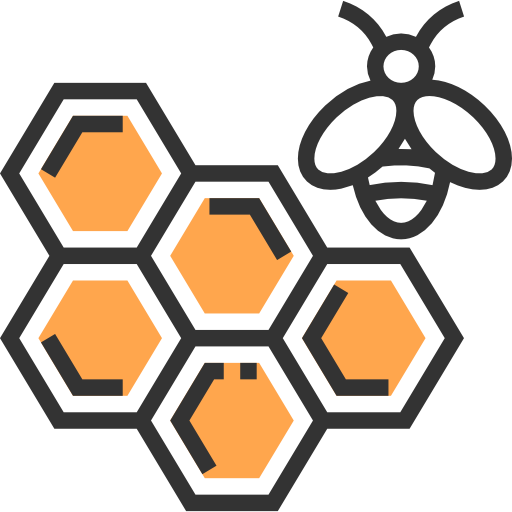
Beekeeping Tips from Christine
- Read up on beekeeping as much as you can. Some of her favorite books include: The Backyard Beekeeper, Beekeeping for Dummies, and The Beekeeper’s Bible.
- Take a beginner beekeeping course, then join a beekeepers club to share experiences and gain knowledge from those who have been keeping bees longer.
- Prepare for at least six months before actually getting your bees.
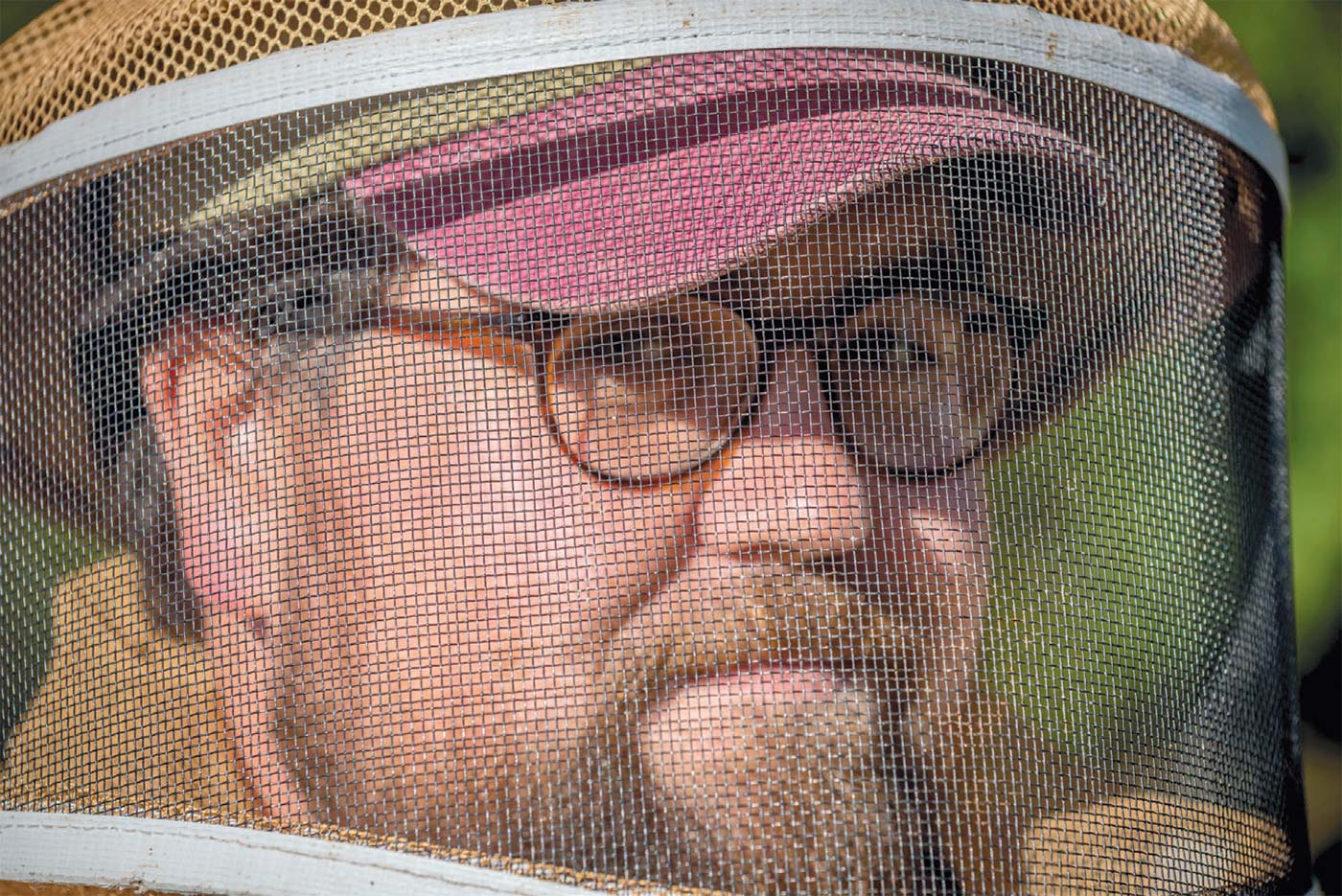
Michael Knapp, Kingwood
“MY SECOND WINTER KEEPING BEES, ALL OF MY HIVES DIED, AND I WANTED TO KNOW WHY.” IN HIS RESEARCH, KNAPP LEARNED THAT HIVE HEALTH HAS A LOT TO DO WITH GENETICS.
For Michael and Lindsay Knapp, the decision to become beekeepers was obvious. The Knapps, who are both teachers, run a small farm CSA called Knapp Homestead from their property in Kingwood. Keeping bees not only supports the health of their crops, it provides an additional teaching opportunity.
While both tend the farm, Michael has taken the role of beekeeper under his wing. “Beekeeping is a total process of discovery,” he says. “For a hobby that some people consider scary, it’s really quite pleasurable.” The Knapps have been keeping bees on their farm for more than six years. Michael Knapp says one reason he loves it is that it allows him to be both a teacher and a student.
“There’s an unfortunate fear associated with bees because they can sting, but honeybees are quite gentle and will only sting if provoked,” he says. “As a teacher, it’s part of my duty to teach this to kids, and to adults alike,” says Knapp, adding that he loves it when people ask questions about his hobby.
Knapp’s love of learning led him to delve deeper in studying colony health, especially in light of colony collapse disorder, Varroa mites, and various other maladies that plague their populations.
“My second winter keeping bees, all of my hives died, and I wanted to know why,” he says.
In his research, Knapp learned that hive health has a lot to do with genetics.
“Finding colonies of bees that have made it through a few New Jersey winters, and have acclimated to our seasons, increases their survival by a lot,” he says. “Bees that get shipped up from the South aren’t hardy—they are not used to our winters yet, and they tend to be weaker and arrive under stress because they’re coming from hives that are always in production and have been transported a long distance on tractor trailers.”
Producing strong colonies led Knapp to take a queen-rearing course at Delaware Valley University in Doylestown, PA, a hands- on course on grafting larvae that included lectures on the biology of bees, genetics, and traits to look for when raising disease-resistant queens. Pretty soon, beekeeping for Knapp evolved into something much larger.
“New Jersey is so densely populated—it’s important for beekeepers to be responsible and thoughtful with their practices since there can be many hives in a small area,” he says, adding that since bees are communal, it’s easy for them to spread pests and disease like American foulbrood or Varroa mites.
“Stronger colonies not only mean a better honey production, they also encourage stronger natural populations,” says Knapp, “and it’s my goal as a beekeeper to promote both.”
Quarantining has allowed Knapp the time to research and learn how to raise queen bees along with growing the apiary. Last summer yielded over 100 pounds of honey, he says, during what proved to be a monumental year. Amid the birth of a child and the loss of a friend, beekeeping continues to be an influential aspect of Knapp’s life.

Beekeeping Tips from Michael
- Choose local, overwintered bees.
- Keep learning. It will take up a lot of mental space in the best way possible.
- You can’t do it until you get your hands dirty. It doesn’t matter how many books you read. Take the plunge and dive in.
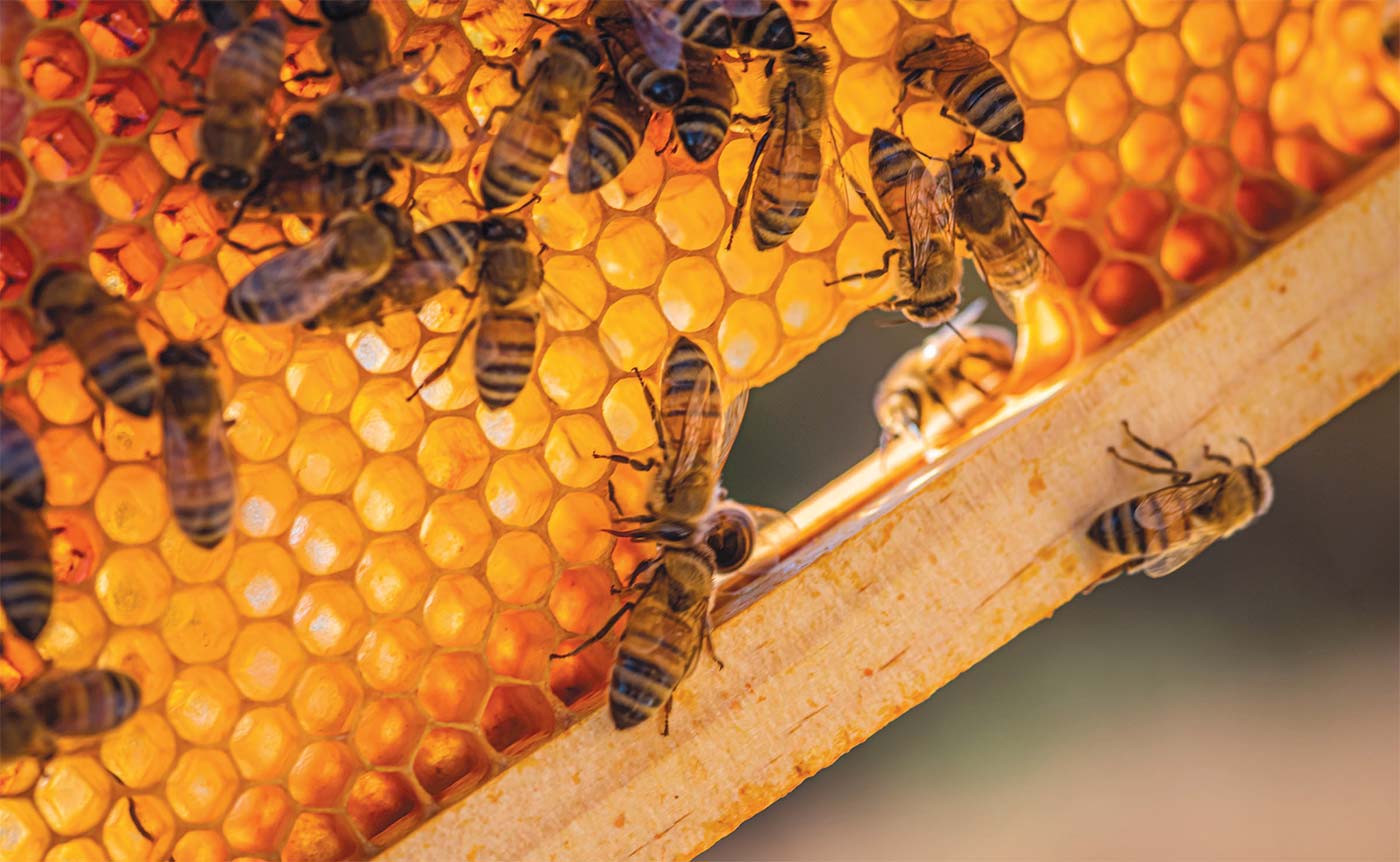
Bill Mikesell, Newark
“EVEN IF YOU DON’T HAVE A LOT OF PROPERTY, YOU CAN STILL DIP A TOE IN AGRICULTURE. IT’S A GOOD THING TO DO.”
While beekeeping in an urban environment can pose certain challenges, it also has some surprising benefits.
Bill Mikesell had a fascination with bees since he was a kid. “I found them to be so gentle. I’d pick them up from the clover and let them crawl over my hand,” he says. Years later, after visiting a friend who kept bees, he decided he wanted to give it a try. From day one, it was an adventure.
“When I went to pick up my bees, I realized as I was driving that the package they were in had cracked, and before I knew it, I had hundreds of bees flying around in the back of my SUV,” he says. “I didn’t have a suit or gloves, but I was somehow able to get them situated in their hive without a single sting,” Mikesell says, recalling the same gentleness he had experienced from them when he was younger.
Mikesell keeps his bees on his 90- by 140-foot yard in Forest Hill, an area of Newark comprised of single-family homes interspersed with high-rise apartment buildings. Though the area is urban, Mikesell explains it’s well suited for beekeeping.
“Not only are there plenty of city parks full of flowering trees and plants, people aren’t as concerned with having a perfect lawn because most of the lawns here are so small,” he says. “This means less use of pesticides and herbicides, which are very harmful to insects.”
Mikesell explains some other benefits of urban beekeeping include being easier to overwinter hives (one of the main challenges) because cities hold heat. In addition, the surrounding buildings help protect hives from cold winter winds.
Mikesell says he’s seen a rise in urban beekeeping, counting at least five beekeepers in his own neighborhood. “Even if you don’t have a lot of property, you can still dip a toe in agriculture,” he says. “It’s a good thing to do. It’s good for the environment, good for the people, and good for the bees.”
As of press time, Covid-19 vaccinations are on the way to Mikesell, and so are the bees. The beekeeper is awaiting the arrival of three nucs for the 2021 season.

Beekeeping Tips from Bill
- Don’t situate your hive where people walk. Also, don’t keep it near a property line. If you do, have it by a fence, forcing the bees to move vertically rather than horizontally. Honeybees prefer traveling upwards, so give them space to go high.
- Allow at least six feet of space in front of the hive, and have it face south or southeast so it gets lots of sun in the early morning.
- If you ask 20 beekeepers a question, you’ll get 20 different answers. Follow your nose and do what you think is right.
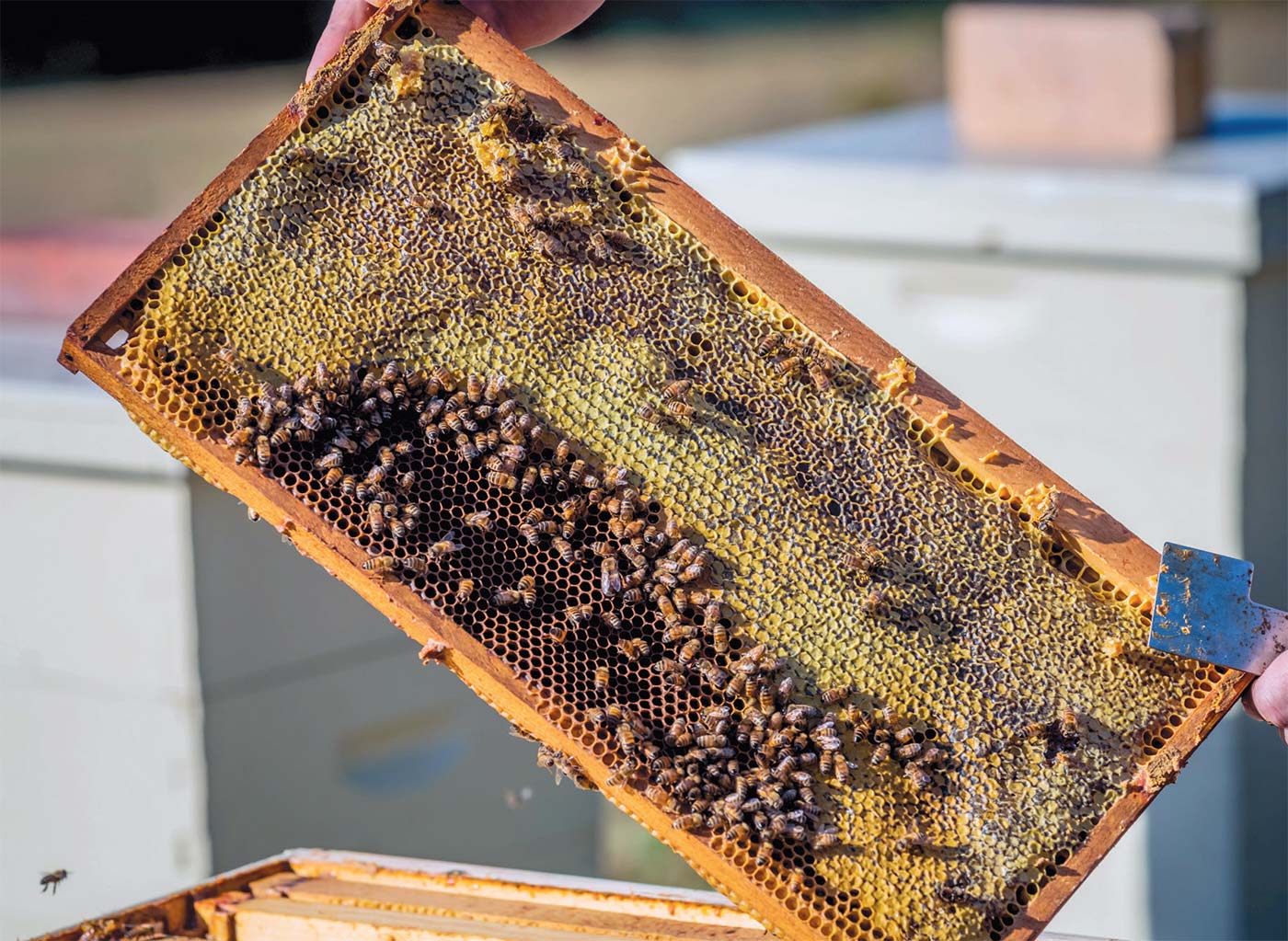
Jason & Meredith Simmons, Hammonton
“WE WANTED TO BE AS SELF-SUFFICIENT AS WE COULD WHILE LIVING SIMPLY. WE ALSO WANTED TO BE ABLE TO TEACH OUR KIDS WHERE THEIR FOOD COMES FROM.”
When they first moved to the property intended to become their future farm, all they set up was a single beehive on the vacant lot. There was nothing much growing there, but the bees began finding a cornucopia of pollen and nectar from the surrounding plants on the property. Before long, they had their first crop: a hive full of delicious honey.
One of the main objectives Jason and Meredith Simmons had for their farm, which they’ve named Thin Place Farm, was to have it sustain their family. “We wanted to be as self-sufficient as we could while living simply,” says Jason. “We also wanted to be able to teach our kids where their food comes from.”
Jason and Meredith’s son Walker, 6, and daughter Ember, 9, were quick to catch the beekeeping bug.
“They love watching the bees and being able to tell which flowers they’ve been visiting by the color of the pollen on their legs,” says Jason. “They each have their own suits and mini smokers, which helps calm the bees before inspecting the hives.”
The children’s fascination (and fearlessness) about honeybees also sparked an interest in learning about other important pollinators like native bees, which are local to the area and essential for native plant pollination.
The pandemic, of course, turned everything upside down for the Simmonses, except when it came to beekeeping. With four hives and a new organic certification for their farm, the couple and their kids still love caring for their bees.
“Our daughter loves collecting insects and identifying whether they’re a beneficial pollinator or an invasive species,” says Meredith. “Her curiosity outweighs any fear,” she says, adding another responsibility of being a beekeeper is helping to support native bee populations.
“We make native bee houses and install them all over the property,” she says. “It’s important that they have places to nest, and food to forage, too.”
In addition, fostering native bees is a great alternative for those who don’t have the space or time for keeping honeybees.
“Keeping honeybees takes some financial investment, time, and knowledge,” she says. “Supporting native and solitary bees is a great alternative because they require little management and are important to our local ecosystems,” says Meredith. “Best of all, it makes it possible for anyone to become a beekeeper.”

Beekeeping Tips from Jason & Meredith
- Gather whatever resources you can. Look for message boards, find a mentor, or connect with beekeeping groups on social media.
- Learn about beekeeping first before diving in.
- Familiarize yourself with the other native bees and beneficial pollinators.
START YOUR OWN
Interested in starting your own hives? These local resources have everything you need to bee-gin.
The New Jersey Beekeepers Association
njbeekeepers.org
Find beekeeping suppliers, seminars, educational courses, and more.
Find your local branch
Many of these local chapters offer classes and scholarships to students. See websites for application information and program dates.
Central Jersey Beekeepers Association
cjba.njbeekeepers.orgNortheast New Jersey Beekeepers Association
nnjbees.orgNorthwest New Jersey Beekeepers Association
nwba.njbeekeepers.orgEssex County Beekeepers Society
ecbs.njbeekeepers.orgSussex County Beekeepers Association
scba.club
TAKE A CLASS
Beginning Beekeeping and Other Courses
Rutgers University’s Office of Continuing Education offers many programs, videos, and classes for beginning and advanced beekeepers. These self-paced, online beekeeping courses cover everything from bee biology to setting up your hives, honey extraction, and more. Due to the pandemic, most will continue to be offered online in 2021. See website for details.
Rutgers Eco Complex, Bordentown
cpe.rutgers.edu/programs/beekeeping.html
MORE ON HIVES & START-UP:
There are a few different types of hive commonly used by beekeepers, including the top-bar hives, Warre hive, and Langstroth hive. The most popular is the Langstroth hive, which consists of hollow boxes with wooden frames with wax foundation that rest inside.
Beginner beekeeping kits, which include everything you need to get started, including woodenware, wax foundation, gloves, a smoker, veiled hat, and hive tool, run about $300.
Starter hives (just the woodenware) can cost between $100–$200, non-assembled versus assembled.
Packages of bees cost about $100.
Nucs (small colonies created from larger, oft en over-wintered colonies) cost about $200.
While hive components, tools, and even bees and can be purchased online, it’s best to shop locally. Visit njbeekeepers.org for a list of suppliers.
Note: If you join your local beekeeping club, you can be put on a swarm collecting list to build your apiary—for free.


